The Plextor M3 (256GB) Review
by Kristian Vättö on April 5, 2012 3:05 AM ESTPerformance Over Time and TRIM
When Plextor sent the drive in for review, they emphazised one thing: a technology they call "True Speed". Supposedly, its job is to guarantee a high performance experience throughout the lifetime of the drive, and even when the drive is at a dirty state. As this technology is firmware related, we don't know how it differs from what others (e.g. Intel and Crucial) have done.
First, lets get the base performance by running HD Tach on a clean drive:
In a clean state, we get 383MB/s read speeds and 329MB/s write speeds. Next we ran the drive through our torture test, which consists of 20 minutes of 4KB random writes (QD=32, 100% LBA space) run on a full drive:
The M3 is still able to manage an average write speed of ~163MB/s. However, the write speed drops to as low as 50MB/s for the first LBAs, while the peak performance is still easily over 300MB/s. Plextor does noticeably better than Crucial in this regard as the performance of the m4 dropped to an average of 35MB/s. However, it should also be noted that the M3 had a higher write speed to begin with.
I wasn't ready to let Plextor go this easily. To see how the "True Speed" technology really works, I secure erased the drive, filled it with sequential data and then tripled the amount of 4KB random writes to 60 minutes:
The amplitude of the graph is a lot smaller now and there are only two small peaks, compared to the previous graph with dozens of peaks. The performance drop is significant as we are looking at 50MB/s on average regardless of the LBA. At the lowest, the performance is 35-40MB/s. That's still better than the Crucial m4, however, even with three times the random data thrown at the M4.
Next I secure erased the drive, reran our 20 minute torture test and let the drive idle for 40 minutes:
It does recover pretty well and we are looking at almost as new performance. There are a few negative peaks where the write speed drops to ~130MB/s, but on average the performance is only 25MB/s short of clean performance.
Finally I formatted the drive to see how it responds to the ATA TRIM command:
And the performance is back to brand new.
These graphs show us that if you are running an operating system with TRIM support (e.g. Windows 7), then there is absolutely no problem with the Plextor M3. If you are running an OS with no official TRIM support for the SSD (e.g. Mac OS X), then a SandForce based SSD will still be a better choice in this regard. However, what I would like to note is that our torture test reflects an extreme usage case.
Even if you are an enthusiast or professional, it's unlikely that your usage model will put the drive in a similar state as our torture test. Our torture test is continuously writing 4KB random data across the drive; in the real world there is almost always some sequential data and idle time in between. As shown in the garbage collection graph, the M3 does not need hours of idle time to restore its performance, so it should maintain its performance pretty well even under an OS with no TRIM.


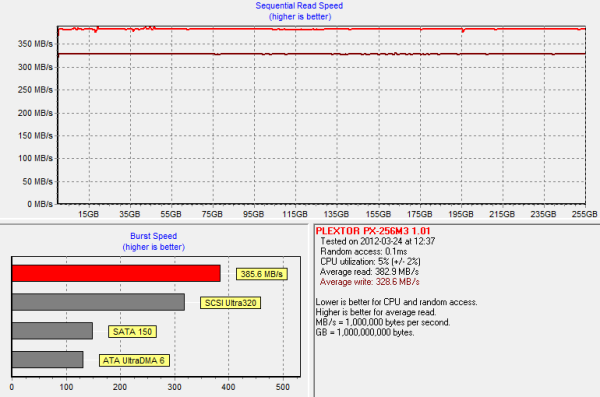
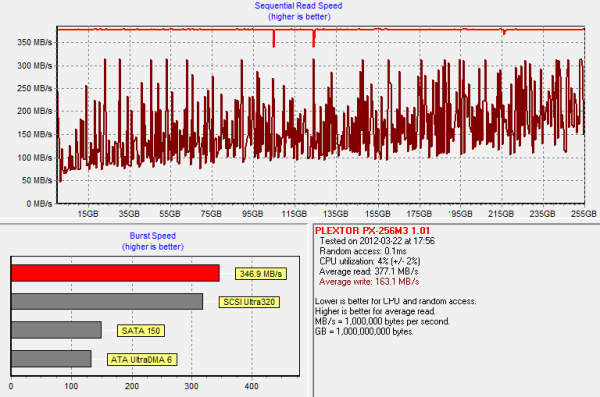
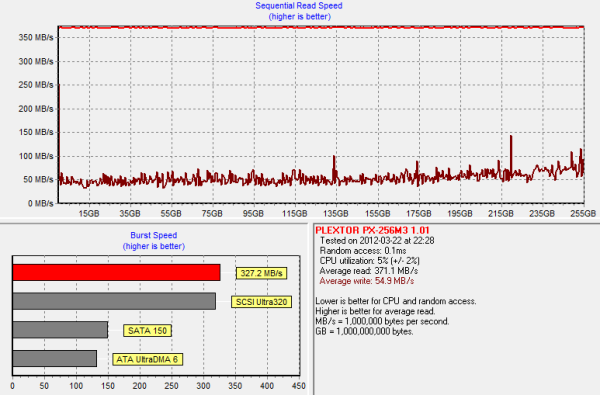
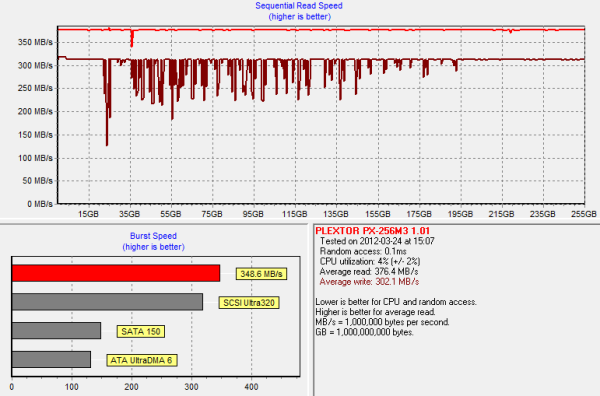
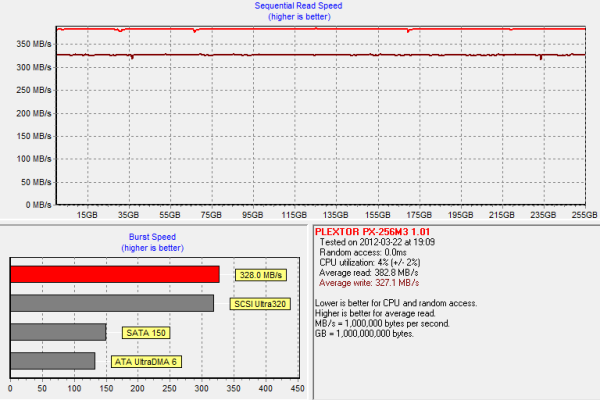








113 Comments
View All Comments
Kristian Vättö - Friday, April 6, 2012 - link
Oops! Thanks, fixed it now. I added the Vertex 4 scores right before this went live so that's why Vertex 4 is not included in any of the analyses.wvh - Thursday, April 5, 2012 - link
Back at the end of the '90s we used to burn a lot of CDs at university, and only the Plextors lasted and rarely burned coasters. It was the brand to have. In fact, the only writer that hasn't broken down on me yet is my Plextor.This isn't a shill ad – it's just a CD-writer after all – I'm just surprised to hear you've never heard of Plextor.
hrrmph - Thursday, April 5, 2012 - link
I may have missed it, but more emphasis on the inclusion (or lack) of toolbox software and what functions it provides would be appreciated. Preferably near the beginning of the review.When I look at ranking SSDs, the inclusion of toolbox software that supports Secure Erase and possibly even 'settable spare area' is important to me.
I find manual (non-toolbox) methods of Secure Erase to be overly complicated and time-consuming.
So the inclusion of toolbox software that supports Secure Erase, and thus easy maintainability is important.
Settable spare area is also nice, because I'm willing to buy an SSD that is the next size up just to get some more spare area, because reliability is extremely important to me.
So when reading a review, while it's nice to know that the manufacturer took the time to provide good firmware and good validation (I'm not sure that validation was well-covered in this review either), it's also very nice if I can quickly 'suss out' whether the manufacturer took the time to make a good toolbox.
To my knowledge, only Intel, OCZ, and Samsung provide a toolbox that allows for easy Secure Erase from inside Windows, assuming the drive is connected to a machine as a secondary drive.
Similarly, I think that only Samsung is allowing settable spare area in their toolbox.
I usually eliminate OCZ from consideration these days because Intel and Samsung provide very adequate alternatives, and most importantly, I saw OCZ forum moderators horribly and publicly abusing some of the other OCZ customers. So while I wasn't abused by OCZ when I was a customer of theirs, I saw the potential.
Coming back to reviews, AT still writes the best reviews in my opinion. I like the non-emotional tone, and the long length, detail, and insightful analysis included in the reviews make them stand out from the crowd.
Other review sites tend to miss even basic points, or worse, they get breathlessly emotional and sensationalist over small differences in the various products. I think AT knows when something is worth getting worked up over, and when it's just run of the mill.
My understanding of the review, is that the Plextor M3 256GB is run of the mill.
I hope I'm not missing something here :).
-
Anand Lal Shimpi - Thursday, April 5, 2012 - link
i agree wholeheartedly - Samsung's toolbox is definitely the new gold standard here. I've been pushing folks behind the scenes to ramp up the quality of their options as well. I want to start paying more attention to it as it's a huge part of the user experience.Take care,
Anand
Kristian Vättö - Friday, April 6, 2012 - link
Unfortunately, there is no toolbox software included in Plextor M3. I have to say I'm not a fan of secure erase either, especially during write tests because this is starting to feel like work!I'll definitely try to concentrate more on the software in future reviews as several readers have requested it :-)
Coup27 - Friday, April 6, 2012 - link
I'm a massive Samsung fan and I have a contact there who says Samsung will be releasing an updated ssd magician either this month or next which will also report ssd life like Intels do. Think they realised disabling the smart values to do it yourself was a mistake, esp if u want to put one in a server.cooldadd - Thursday, April 5, 2012 - link
Kristian, I commend your writeup. New and capable talents are welcome in this arena... You will certainly have a chorus of voices with earlier/other perspectives, but they in their own way will bring you "up to date" on history prior to your entry into the mix!We are living in an amazing frenzy of technical advancement. Thirty years into the development of the telephone, for instance, not only would few people have been able to have technical discussions over its progress, but there was no popularly-available medium in which to discuss it!
I discovered AnandTech when it was new, sixteen years into my mainframe career, started by a young person like yourself who happened have a sharp technical curiosity and an ability to write well. I hope your contributions will follow in similar fashion.
Bozo - Friday, April 6, 2012 - link
I must be getting old...Back when burnable CDs came out you needed a SCSI burner like 'Smart & Friendly' to make more good CDs than coasters. Then Plextor introduced one of the first PCI burners that actually made more good CDs than coasters. It was the CD burner to have if you were serious about making usable CDs.
I feel old.
sbmeirow - Friday, April 6, 2012 - link
If you haven't heard of Plextor, then you are a newbie, and I don't read articles written by n00b's.Coup27 - Friday, April 6, 2012 - link
Idiot.